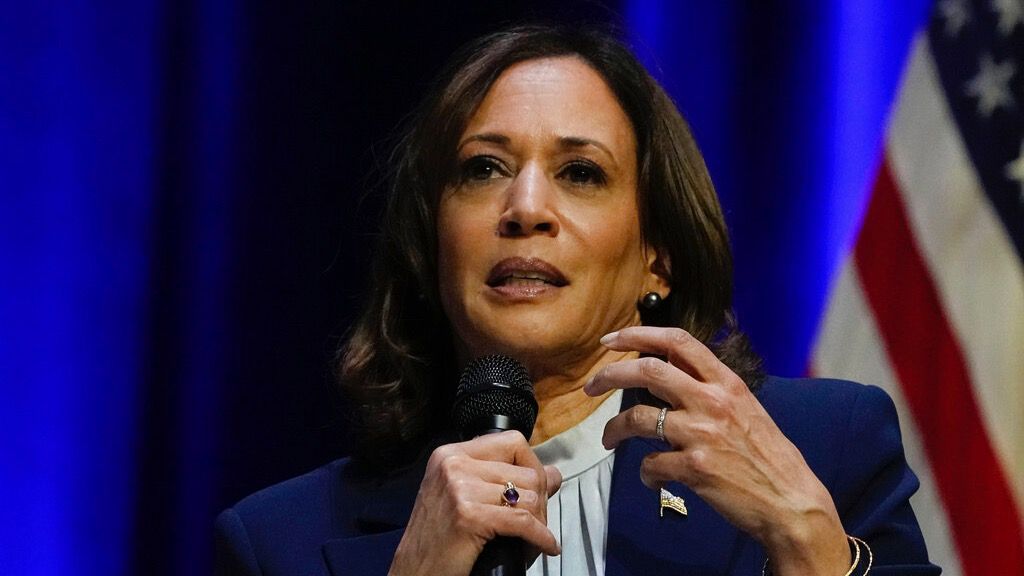Vice President Kamala Harris was in College Park, Ga., on Monday to kick off a national tour where she will tout the Biden administration’s economic policies — with particular focus on equity and small business entrepreneurship — as she and President Joe Biden attempt to secure a second term in the White House amid sagging poll numbers on the economy and among Black voters.
The first stop was just outside Atlanta in the key swing state of Georgia, which the Biden-Harris ticket narrowly won in 2020 and which will likely again be one of a handful of competitive states that will decide the presidency this fall. Former President Donald Trump, the 2024 presumptive GOP presidential nominee, currently leads Biden in Georgia polling by an average of nearly seven percentage points, according to FiveThirtyEight.
“Yes, everybody wants a job. And President Joe Biden and I are very proud that in our administration, we have brought Black unemployment down to historic lows. But that’s a baseline,” Harris said in a discussion with the hosts of Earn Your Leisure, an entrepreneurship podcast. “In spite of those who in certain parts of our country want to attack DEI [policies,] we understand that you can’t truly invest in the strength of our nation if you don’t pay attention to diversity, equity and inclusion.”
She highlighted the Biden administration’s efforts to ensure more equitable implementation of policy by walking through the history of racist U.S. government policies, including the exclusion of Black veterans from the GI Bill laws that paid for service members’ college educations after World War II, the redlining of neighborhoods and urban planning the cut up Black and impoverished neighborhoods.
Now, Harris argued, the government was repairing some of the damage by offering student loan relief to borrowers who are disproportionately likely to be from minority communities, by funneling funds to minority-owned businesses and by spending billions on reconnecting and building up communities harmed by decades of urban development. Part of the reason Harris was in Georgia was to champion a $158 million investment through the administration’s Reconnecting Communities and Neighborhoods Program — funded by the 2021 Bipartisan Infrastructure Law and the 2022 Inflation Reduction Act — into Atlanta’s “The Stich” project, which intends to reconnect predominantly Black parts of downtown and midtown Atlanta that were cut up by the construction of a highway in the middle of the last century.
But despite the achievements, through landmark legislation and executive action, the agenda still needs selling, Harris said.
“The president and I, when we first came in, made a commitment that we are going to increase by 50% the number of federal contracts going to minority-owned businesses and we’re on track to get that done,” Harris said “One of the compelling reasons for me to start this tour now and to ask all the leaders here for help in getting the word out about what is available to entrepreneurs and small businesses, is because we are in the process of putting a lot of money in the streets of America for this growth, and we want to make sure everyone has access to the opportunity.”
Taking credit for the post-pandemic economic bounce back and heralding legislation that equals trillions of dollars of government investment in U.S. industry has proven difficult for Harris and Biden. Some of Biden’s worst polling numbers when contrasted with Trump are on his handling of the economy, with 62% of voters who said the economy is deeply important to them choosing Trump over Biden in a CNN/SSRS national poll released this week.
In Georgia, 85% respondents told pollsters for Bloomberg and Morning Consult last week that the economy was a “very important” factor in deciding who to vote for this fall and 41% said it was the single most important issue, by far the highest rates of any of the 16 issues pollsters asked about. Among all Georgia respondents to the poll, 53% said they trusted Trump more to handle the economy, compared to just 35% who said they trusted Biden more. In 2020, Biden eked out a victory in the state by less than 12,000 votes, or under a quarter of a percentage point.
Monday’s event and the tour of the White House dubbed the “Nationwide Economic Opportunity Tour” are official government events, meaning campaigning is, strictly speaking, not allowed. But Harris and other Democrats present tried to make the case that sending them back to Washington in power would continue to help Georgians, Black Americans and the country at large.
A poll by The Associated Press-NORC Center for Public Affairs Research, found just over half of Black Americans said they approve of Biden’s handling of his job in March while 45% said they disapprove.
“All of these deliverables represent the good that we can accomplish when we put politics aside and center the people,” said Sen. Raphael Warnock, D-Ga., whose narrow victory in an early 2021 runoff election alongside Sen. Jon Ossoff, D-Ga., gave Democrats control of both houses of Congress for Biden’s first two years. “I’m going to keep working with the president and with the vice president and my fellow Georgia lawmakers to keep delivering these strong investments, and make sure the work we’re doing in Washington works for the people of this state.”
Spectrum News’ Maddie Gannon contributed to this report.




